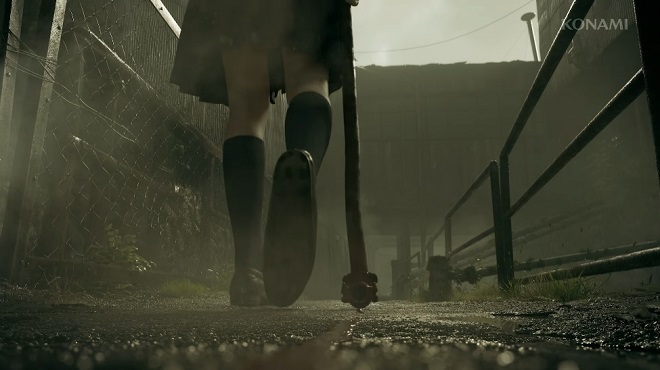Cognition Dissemination: Konami Is Back… Right?

Konami’s Silent Hill franchise was largely dead following Silent Hill: Downpour’s release a little over a decade ago, outside spinoff Book of Memories and slot machines, which don’t count. We could have received Silent Hills from Kojima Productions following the PT demo, but that was, let’s say, not to be.
That’s “was” because the franchise is being given new life, as shown through the Silent Hill Transmission, in which they announced four video game projects.
There’s a remake of Silent Hill 2 coming from Bloober Team, which looks better than cynics would have you believe. The Silent Hill: Ascension interactive streaming series is another project consisting of smaller experiences made by several developers. There’s Silent Hill: Townfall from No Code and publisher Annapurna Interactive for the third project. The fourth, the one I’m personally most interested in, is Silent Hill f from NeoBards Entertainment, which will take place in Japan during the late 1960s and feature a story provided by Ryukishi07 (Higuraishi: When They Cry) with art from Kera. These projects are a while off considering no release timeframes were provided for any of them, but at least they’re coming.

These, and the recent announcement of Suikoden I & II HD Remaster at Tokyo Game Show, show that Konami is indeed investing in game development again. But there’s a riskier question: Are they back?
No. Not yet, anyway. There’s no need for me to ponder over the question before finally coming to a conclusion near the end of this post, given the company involved. But these recent announcements put them on the path to coming back.
Konami largely abandoned contributions to the “core” gaming market following the break-up between the company and Kojima Productions. Their subsequent strategy entailed primarily focusing on the mobile and pachinko markets and Yu-Gi-Oh! while making occasional contributions to console video gaming of varying quality. Super Bomberman R turned out well, but Metal Gear Survive received a divisive reception, and the less said about Contra: Rogue Corps the better. But this is the first time in a long time, since the days when Hideo Kojima was a prominent face at the company, that they’ve announced so many projects so quickly.
It didn’t seem like Konami would ever be back in the core gaming development world. Why would they? The gaming audience was hot and pissed at them for pushing Kojima out in 2015 after he spearheaded several projects at the company for more than two decades, and Konami’s financials were fine — great, even — through pursuing other ventures. But recent market changes have left them little choice but to dip back into the video gaming pool. The pachinko industry was devastated over the last few years, after it being unsafe to visit parlors during a pandemic, and who knows if it will ever fully recover. The mobile gaming world is dominated by select titles that whales contribute, while other developers fight for scraps. Now that the gaming audience has other issues to be mad about, Konami has returned.
The newest projects raise questions themselves. It’s notable that none of them are being developed internally, but it’s not surprising. The last title handled by their internal studios was the aforementioned Metal Gear Survive, largely handled by the remaining Kojima Productions staff that didn’t join Kojima himself at the resurfaced independent iteration. But the game heavily reused assets from the Metal Gear Solid V titles. Their internal studios might be down to a skeleton crew, so they have little choice but to outsource the main developments for these titles while planners within the company concept the games.

It’s merely a question of when the other classic Konami franchises will be tossed into the outsourcing whirlwind. Castlevania was previously in one when the Lords of Shadow games were outsourced to MercurySteam by Kojima Productions, and Castlevania: The Adventure ReBirth to M2. They could continue this strategy with more titles, alongside rereleasing the latter title years after WiiWare’s closure. (Contra ReBirth and Gradius ReBirth should come with it.) It’s long past time to capitalize on the success of the Netflix animated series. Suikoden could be thrown into the mix, though I couldn’t possibly make any guesses as to what form that would take. I know a Japanese RPG developer that could use the work, though, and it’s not like Konami hasn’t worked with them before. The most interesting experiments here would be for the Metal Gear franchise, inevitable given the franchise’s popularity. Maybe we’ll finally get that Metal Gear Rising: Revengeance sequel.
Whether these outsourcing experiments will turn out well will depend on whether Konami has talented planners and producers overlooking the projects. As I mentioned above, Super Bomberman R was well received, but Contra: Rogue Corps was a poor effort. But the latter’s developer, Toylogic, has produced quality titles, like the 3DS version of Dragon Quest XI, NieR Replicant ver.1.22474487139…, and now-defunct free-to-play multiplayer title Happy Dungeons. Several developers used for outsourcing projects are capable of producing quality titles when planners are hands-on and they’re given sufficient budgets.
Whether Konami is “back” will depend on whether they’ve learned how to handle outsourced projects well. If they have, we could see a resurgence of their franchises and titles in the near future. If not, it will the same as it ever was. Keep those expectations tempered.





